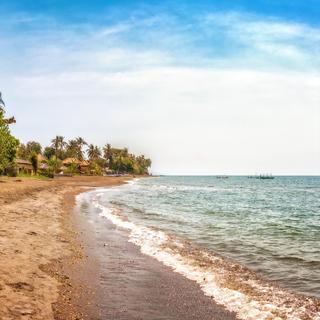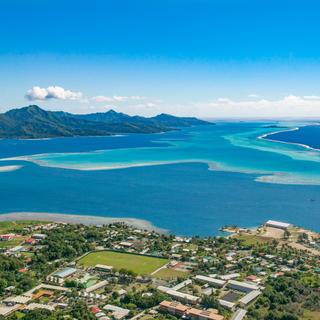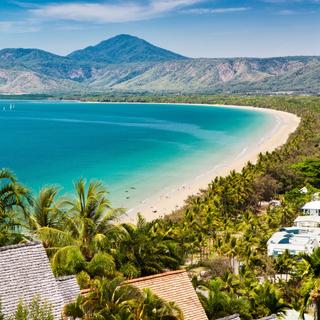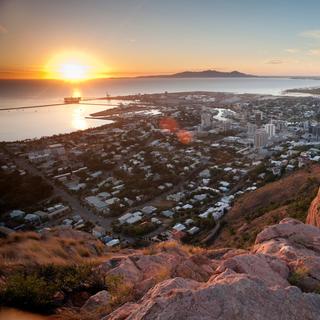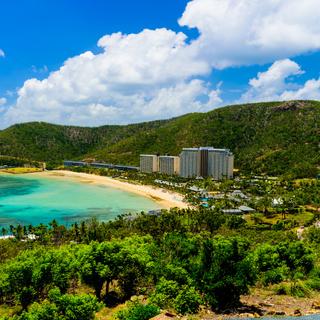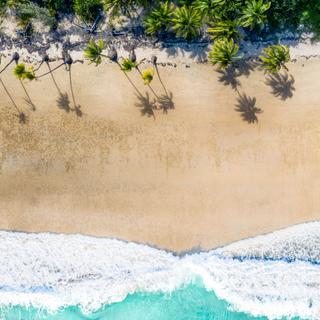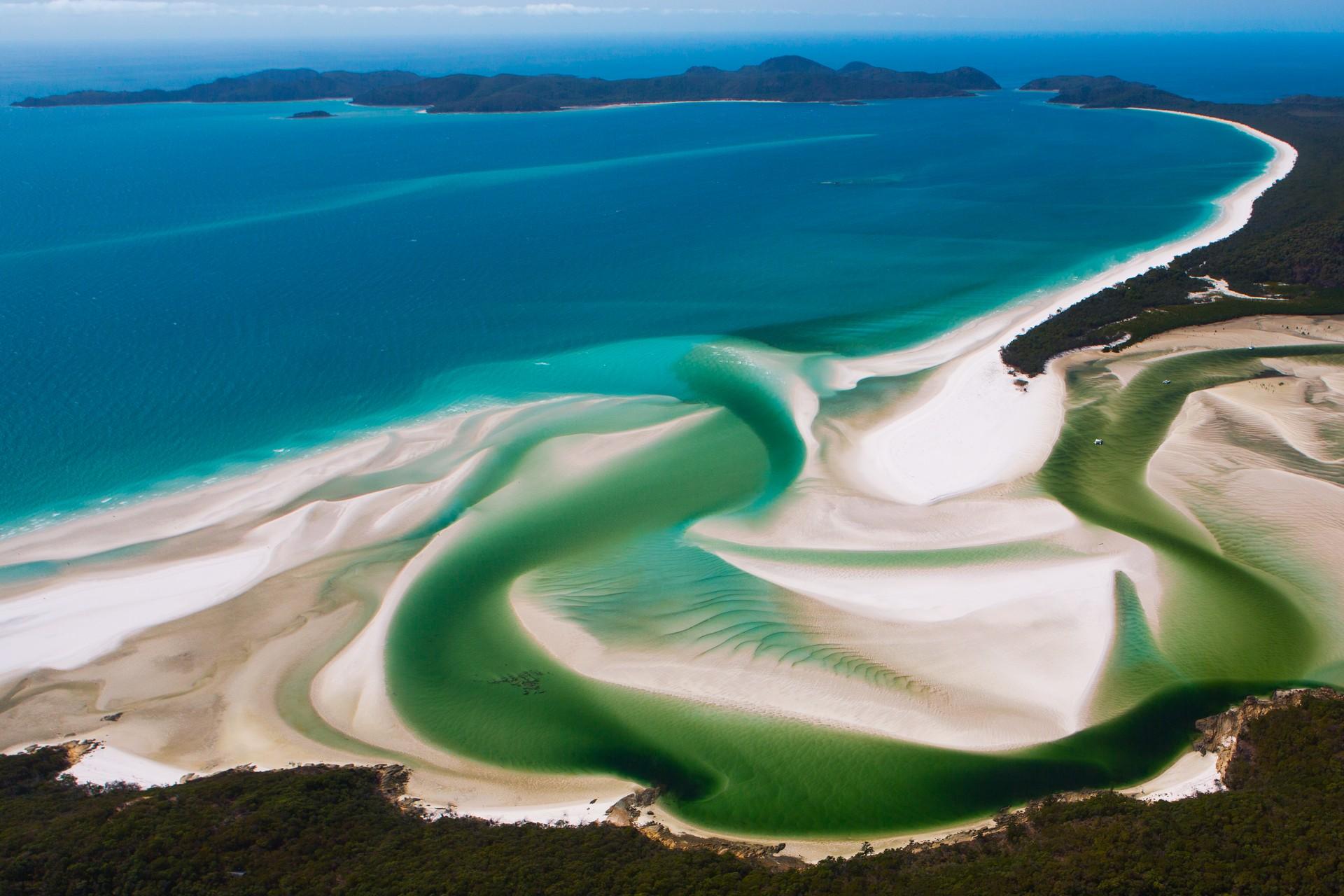
Airlie Beach weather and climate in 2025

Airlie Beach weather and climate in 2025
Day
24 °C
Night
13 °C
Sea
22 °C
Precipitation
35 mm
in month
Rainy days
6 days
in month
Daylight
11 hours
average
Sunshine
7 hours
average
Humidity
68 %
Weather charts for Airlie Beach

Find more destinations like this
Destinations with similar weather to Airlie Beach
Other destinations in Queensland - Northeast coast - Australia
Closest cities for Airlie Beach
Weather overview for Airlie Beach
Weather overview
Airlie Beach, located in Australia, offers a tropical climate with warm to hot temperatures throughout the year. Daytime temperatures vary from a cooler 24 °C (75 °F) in July to a balmy 31 °C (89 °F) in December. In terms of precipitation, September is the driest month with only 4 days of rain, whereas February is the wettest with up to 18 days of rain. For those intrigued by sea temperatures, you can enjoy the warmest waters in February with temperatures peaking at 28 °C (83 °F) and the chilliest seas in July, dipping to 22 °C (71 °F). The nighttime temperatures are also noteworthy, hitting their zenith in January at 23 °C (74 °F), and reaching their nadir in July at 13 °C (56 °F).
January weather
Airlie Beach is gearing up for the tourist season, witnessing a rise in the number of rainy days to 15 days. Similarly, the volume of rainfall increases, now standing at 250 mm (9.83 in). Sea temperature is warming, currently at 28 °C (83 °F), while night temperatures peak in January. The duration of sun hours shows a gradual decline, now at 8 hours.
February weather
With the commencement of the wet season in Airlie Beach, there's a noticeable peak in the number of rainy days reaching 18 days, along with the highest rainfall accumulating to 326 mm (12.83 in). Sun hours decrease to 7 hours, while high humidity and warm sea temperatures of 28 °C (83 °F) characterize the month of February.
March weather
As the wet season persists, Airlie Beach begins to experience a slight decline in sea temperature which is now at 28 °C (82 °F). Day temperatures also start to decrease this month. The number of rainy days shows the onset of a decrease at 16 days, while rainfall amounts also follow this declining trend in March. The duration of sun hours reduces further to 7 hours.
April weather
The onset of the tourist season is marked by continuing reductions in day temperatures, now averaging 29 °C (83 °F), with the sea temperature following suit at 26 °C (80 °F). As the wet season carries on, the rainfall amount also continues to decrease, reaching 140 mm (5.51 in), and fewer rainy days are recorded at 15 days.
May weather
During this month of the tourist season, Airlie Beach's sea temperature continues to drop to 25 °C (77 °F), reflected by decreasing day temperatures now at 26 °C (79 °F). The trend of fewer rainy days continues, now at 13 days, and rainfall amounts also see a diminishing trend, with a total of 93 mm (3.67 in). Minimal sun hours signal the lowest point with a value of 7 hours.
June weather
As the tourist season concludes, day temperatures in Airlie Beach continue to decline, now at 24 °C (76 °F), and sea temperatures also persist in their downward trend, now at 23 °C (73 °F). The decrease in rain becomes more apparent, with the total rainy days now at 8 days, and rainfall amounts continue to show a reduction, now at 54 mm (2.14 in). Meanwhile, the night temperature also continues to fall, now at 15 °C (58 °F).
July weather
In the peak tourist season, Airlie Beach experiences the lowest day temperatures, paralleled by the minimum sea temperatures observed in this month. The trend of declining rainy days continues, and rainfall amounts are also at their lowest of 35 mm (1.38 in). The coolest night temperatures of the year are recorded, averaging around 13 °C (56 °F).
August weather
The beginning rise in day temperatures is noticeable in Airlie Beach, now at an average of 25 °C (77 °F), with the night temperature also showing signs of an increase, now at 14 °C (58 °F). As the tourist season continues, dry conditions prevail with the declining trend of rainy days now at 5 days. A gradual increase in sun hours starts to become evident.
September weather
In anticipation of the tourist season, Airlie Beach sees a rise in sea temperature, now at 23 °C (74 °F), with day temperatures also on the incline, reaching 28 °C (82 °F). The minimum number of rainy days is observed, as well as the lowest rainfall amounts of 22 mm (0.86 in). The night temperature is on an upward trajectory as well, now at 17 °C (63 °F).
October weather
As the tourist season advances, sea temperatures in Airlie Beach climb to 25 °C (77 °F), and the upward trend in day temperatures continues, now at 29 °C (84 °F). A slight rise in the number of rainy days can be observed, now at 6 days, and minor increases in rainfall amounts also start to become clear, with a volume of 39 mm (1.54 in). The maximum number of sun hours, indicating plentiful sunshine, is now at 9 hours.
November weather
As the tourist season remains vibrant, the day temperature in Airlie Beach continues its rise, now averaging 30 °C (87 °F), and the increasing sea temperature also becomes more apparent, now at 26 °C (79 °F). A gradual rise in the number of rainy days can be detected, with this figure at 8 days, along with a noticeable increase in rainfall amounting to 76 mm (3.00 in). The rising trend of night temperatures becomes evident too.
December weather
As day temperatures reach their zenith, peaking at 31 °C (89 °F) in Airlie Beach, the escalating sea temperatures are also witnessed, now at 28 °C (82 °F). The tourist season is in full swing with rising rainfall amounts recorded at 160 mm (6.29 in), and an upward trend in the number of rainy days now at 11 days. A subtle rise in night temperatures aligns with the previous month's increases.
FAQs
Would you recommend visiting Airlie Beach in January?
January in Airlie Beach boasts superb conditions for a getaway. Expect day temperatures around a pleasant 31 °C (88 °F), with the seawater temperature being ideally warm at 28 °C (83 °F). Evenings remain agreeable with an average temperature of 23 °C (74 °F).
Are the sun hours diminishing in Airlie Beach during February?
Indeed, the average daily sunshine duration in Airlie Beach for February is on a downward trend, currently at 7 hours.
Is the sea temperature in Airlie Beach starting to cool down in March?
Yes, the sea temperature in Airlie Beach begins to cool down slightly in March, currently at an average of 28 °C (82 °F).
Is the rainfall amount in Airlie Beach lower in April compared to previous months?
Indeed, April sees a lower amount of rainfall in Airlie Beach, with recorded levels at approximately 140 mm (5.51 in).
What's the trend for sun hours in Airlie Beach during May?
In May, Airlie Beach hits the lowest point in the trend for sun hours, with an average of just 7 hours per day.
Does Airlie Beach experience less rainfall in June?
June marks a period of reduced rainfall in Airlie Beach, with a lower count of rainy days at approx. 8 days.
Is July the coolest month in Airlie Beach in terms of sea temperatures?
Yes, July marks the time when Airlie Beach sees its lowest sea temperatures of the year, at about 22 °C (71 °F).
As the dry season persists, does Airlie Beach begin to warm up again in August?
August in Airlie Beach indeed signals a warming trend with both day and night temperatures beginning to rise again.
What can be said about the precipitation pattern in September at Airlie Beach?
September in Airlie Beach features the lowest level of precipitation with a minimal number of rainy days throughout the year.
Does Airlie Beach enjoy the maximum sun hours in October?
October definitely offers the most sun hours in Airlie Beach, giving visitors ample opportunity to enjoy the sunshine, with the average reaching 9 hours per day.
With the rising day temperatures, is Airlie Beach getting warmer in November?
November in Airlie Beach is indeed becoming increasingly warm, with day temperatures climbing to an average of 30 °C (87 °F).
Is December considered a month with higher rainfalls in Airlie Beach?
December is noted for an increase in rainfall in Airlie Beach, with totals reaching about 160 mm (6.29 in) and a higher figure of rainy days at 11 days.

